Gay marriage

The debate is over.
In a landmark decision, the Supreme Court decided this morning that marriage was a fundamental right for all couples regardless of gender. All Americans who wish to can now marry the same-sex partner they love. Every state law that bans such marriages is now dead. And it is over. It is finished. This debate, at long last, is done.
This is a good day to be present. I want to document this day into my memory, so I might tell my children about it later. Although at 25 I can’t possibly understand all this decision entails, there may be a day down the road when I stand tuxedoed and teary-eyed and holding the hands of another, and I want this memory to color that moment. I want to feel the gift of it.
But this day also brings up a lot of complicated feelings for me, too. I am, after all, a follower of Jesus, and many in this family of Christians are not celebrating with me. They are unsure of what to say, uncertain of what the future holds.
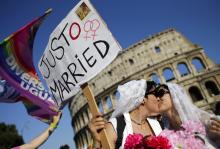
Pope Francis on June 14 stressed the importance of children having heterosexual parents, just a day after Rome’s gay pride march demonstrated the changing attitudes about same-sex couples outside the Vatican walls.
Addressing around 25,000 followers from the Diocese of Rome, the pope said the differences between men and women are fundamental and “an integral part of being human.”
The pontiff likened a long-lasting marriage to a good wine, in which a husband and wife make the most of their gender differences.

When I reached high school and started dating, my relatives had a lot of questions: "This girl you’re going to the movies with: Is she Catholic? Slovak? What’s her family’s last name? What does her father do for a living?"
She had to be Catholic, of course. Preferably Slovak. If not, some other nearby nationality. Anything less would get disapproving comments. Those questions may sound odd now, but they mattered back then. The Catholic Church had only recently concluded Vatican II, which tried to bridge centuries of animosity between churches. Accepting Protestants as equals was something new. And many of the immigrants in my neighborhood were trying to preserve the culture and traditions that they brought from Europe. They were afraid of losing their heritage in the new land.
For them, traditional marriage meant choosing someone from the same faith, the same ethnic background. Simply put, they were afraid. Terrified, actually. They feared that if marriage changed, their world would fall apart.
That's why to so many people, my relationship wasn’t about finding someone who fit me — it was more about me finding someone who fit them.
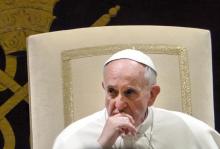
Pope Francis will meet a gay married activist in Paraguay next month, according to an LGBT rights group in that country.
The pontiff is due to meet Simon Cazal, co-founder and executive director of SomosGay, on July 11 at the Paraguayan Episcopal Conference in Asuncion, the country’s capital.
Catholic conference organizers approached Cazal earlier this month with an invitation in which they noted the “impact of your organization on Paraguayan society.”

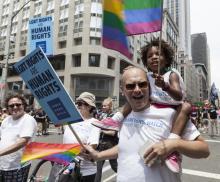
By the end of June — and as early as next week — the Supreme Court is expected to rule on the legality of gay marriage nationwide. In a pre-emptive move to refocus narrative and legislative control at the state level, two states this week enacted laws designed to protect religious objection to same-sex couples. Here's how.


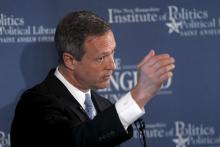
Martin O’Malley, who just wrapped up his second term as Maryland governor, is loudly, proudly Catholic — even when some doctrine-devoted church followers hiss at his socially liberal views.
Here are five faith facts about O’Malley, 52, who is expected to announce his candidacy on May 30.

In many ways, Ireland remains a heavily Catholic country.
Yet the emphatic “Yes” vote to same-sex marriage rights on May 22 represents a seismic shift in the nation’s social liberalization and challenges the Roman Catholic Church to rethink its role in Irish society.

“In Ireland,” says a character in a 1904 George Bernard Shaw play, “the people is the Church, and the Church is the people.”
But not so much anymore.
On May 22, voters in this once deeply Roman Catholic country will decide whether the country’s constitution should be amended to allow for gay marriage. If the amendment passes, Ireland will become the first country to legalize same-sex civil marriage by popular vote.
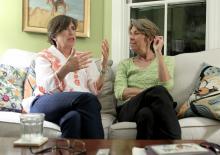
Same-sex marriage is so last decade in Massachusetts. These days, the earliest pioneers in gay and lesbian matrimony are demonstrating how to raise kids, retire — even divorce.
As the Supreme Court wrestles with what Chief Justice John Roberts last month labeled a redefinition of marriage, the couples who successfully challenged the Bay State’s ban on gay marriage in 2003 are juggling work and retirement, raising kids who turn down Ivy League colleges, and holding joyful family reunions.

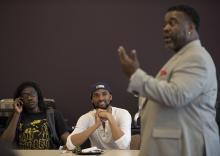
Is gay marriage a civil right like black equality? Or is it a sin African-Americans should condemn?
That’s the question at the heart of The New Black, a documentary by filmmaker Yoruba Richen that examines African-American attitudes toward LGBT people leading up to Maryland’s public referendum on gay marriage in 2012.
The film is now enjoying a new life as part of an initiative to get students at historically black colleges and universities to talk about a longtime taboo in the African-American community — sexual identity and the church.

The U.S. Supreme Court is now weighing arguments in the same-sex marriage case it heard on April 28 that could lead to a landmark decision requiring all states to acknowledge the unions.
But don’t count Texas out without a fight.
State lawmakers are considering at least five bills designed to block same-sex marriages, which are currently illegal in the state, and some state leaders say they’ll battle to bar the unions regardless of any Supreme Court decision.
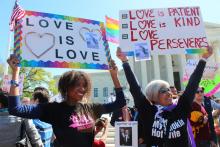
People who argue against marriage equality frequently do so for religious reasons, even if they cast their argument in secular terms. While I believe there are strong constitutional arguments for striking down bans on marriage equality, I support striking down these bans because of my faith, not in spite of it.
For too long, religious institutions have contributed to the scourge of homophobia that fuels the discrimination that this case seeks to strike down. Far too many of us are familiar with the discrimination, fear, and violence that gay and lesbian people have suffered while people of faith turned a blind eye or, worse yet, acted as perpetrators.
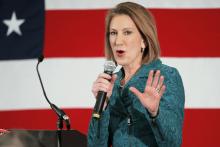
Carly Fiorina formally launched her 2016 presidential run on May 4. But she’s long been working the Christian talk and radio circuit appealing to a traditional Christian voter base.
Here are five faith facts about the former Hewlett-Packard CEO turned business consultant.

Only a few dozen worshippers attend Boston’s Tremont Temple Baptist Church on a typical Sunday, but the historic church was once so prominent that legendary preacher Dwight L. Moody called it “America’s pulpit.”
This week, Tremont’s massive auditorium played host to influence once again when 1,300 Christian leaders gathered for the Q conference to discuss the most pressing issues facing their faith. There was no official theme, but one strand wove its way through multiple presentations and conversations: America’s — and many Christians’ — debate over sexuality.
While at least three other Christian conferences during the past year focused on same-sex debates, this is the only one to bring together both pro-gay speakers and those who oppose gay marriage and same-sex relationships.
“The aim of Q is to create space for learning and conversation, and we think the best way to do that is exposure,” said Q founder Gabe Lyons.
“These are conversations that most of America is having, and they are not going away.”
Which is not to say Lyons’ decision was without controversy.
Eric Teetsel, executive director of the Manhattan Declaration project that aims to rally resistance to same-sex marriage, urged Lyons to rescind his invitations to pro-gay panelists, whom he called false prophets professing to be Christians. Owen Strachan, president of the Council on Biblical Manhood and Womanhood, echoed the sentiment and tweeted that he was “shocked that @QIdeas features pro-‘gay-Christianity’ speakers.”
Lyons did not respond publicly to the criticism, but said such positions were rooted in fear.

One of the hot button topics in America today is same-sex marriage. This issue has been in the news often due to same-sex marriage bans being struck down in state after state and on the minds of many after the controversial “religious freedom” law passed in Indiana (and similar ones already enacted in other states). And it has been in the hearts of many gay and lesbian couples faced with the possibility of being denied access to services because of who they are and who they love.
Imagine planning and preparing for your wedding for months, making decisions about guest lists, music, menus, seating charts, and attire. You go to the lone bakeshop in town to talk about your cake choices, only to be told that the baker is not willing to work with you because you are gay or a bi-racial couple or a couple from another faith tradition. Imagine the feelings of rejection, isolation, and denial that you would potentially feel, because the state allows this denial of services. This scenario is not hard to imagine, because it is legally allowed in many places throughout our country.
“Othering” happens all the time for many different reasons – not just sexuality, race, and gender.
About 10 years ago, my son and I were at a local park playing on the swings when a group of young boys started taunting a small child with a disfigured arm about 50 yards away from us. They were calling her ugly names and throwing small rocks and sticks in her direction. We had seen this little girl playing happily, running around, and laughing with delight. But now she looked terrified.
I heard the taunts and began moving that direction to intercede, but my son outran me. Only six years old at the time, he yelled at the boys, “Leave her alone. She’s just like us.” The boys saw and heard my son and likely saw an adult close on his heels. They abandoned their harassment and ran away.
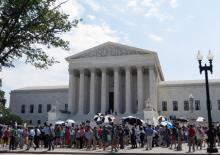
As the U.S. Supreme Court prepares to hear arguments on April 28 that could wind up legalizing gay marriage nationwide, dozens of Christian leaders have issued a call to civil authorities to preserve “the unique meaning of marriage in the law” — but also to “protect the rights of those with differing views of marriage.”
The open letter “to all in positions of public service,” released April 23, seems to reflect a growing recognition by same-sex marriage foes that they may be on the losing side of the legal battle to bar gay marriage and need to broaden their focus to securing protections for believers.
Gay marriage opponents are also losing the battle for the hearts and minds of their own flocks: Polls show that American believers, like the rest of the public, are growing much more accepting of same-sex relationships, or at least much less inclined to invest time or resources into waging the fight against legalizing gay marriage.
This week’s statement, “The Defense of Marriage and the Right of Religious Freedom: Reaffirming a Shared Witness,” was signed by 35 religious leaders representing Catholic, evangelical, Pentecostal, Orthodox, and Mormon churches. The only non-Christian signatory was Imam Faizul Khan of the Islamic Society of Washington Area.
The leaders forcefully reiterate their shared belief that marriage is “the union of one man and one woman” and argue that apart from religious doctrines, the state “has a compelling interest in maintaining marriage” for the good of society and the “well-being of children.”